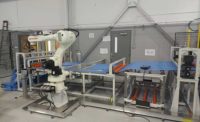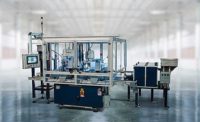At the beginning of 2020, Hervé de Malliard, CEO of systems integrator MGA Technologies in Civrieux d’Azergues, France, observed the first signs of the COVID-19 crisis. As chairman of the Auvergne-Rhône-Alpes Committee of French Foreign Trade Advisors, he anticipated that there would be a shortage of medical equipment and contacted the health authorities.
“French hospitals only had 5,000 ventilators available,” recalls de Malliard, whose company specializes in designing and building automated machinery for the medical device and pharmaceutical industries. “With global production capacities saturated, and all available stocks having already been snapped up, we didn’t have a moment to waste in order to save lives.”
MGA compiled a list of 62 ventilator manufacturers located throughout the world, established what their capacities and stocks were, informed them of the upcoming shortage of consumable items, then proposed that the government build up a state reserve of filters for ventilators to cover the country’s needs for several months or even several years.
“The state accepted this offer—provided that we would be responsible for manufacturing these medical devices and maintaining a 100 percent French-owned subsidiary,” says de Malliard.
As an ambassador for La French Fab, a coalition of organizations and businesses created to foster and promote French manufacturing, de Malliard got together a group of French manufacturers and start-ups to produce the 400 parts needed to make a ventilator, thus creating a French supply chain for components. This was critical. When international borders began closing due to the pandemic, strong local supply chains enabled countries to be self-reliant.
“Fortunately, Southeast France possessed the industrial resources for the project, ” notes de Malliard.
Institut Mérieux, a French pharmaceutical conglomerate in Lyon, introduced de Malliard to Adrien Mithalal, director of PhysioAssist, a ventilator manufacturer in Aix-en-Provence. Mithalal advised de Malliard on the design and manufacture of ventilators and opened up his network to source parts and materials.
One member of that network is Infiplast, an injection molder that makes parts and subassemblies for the automotive, aerospace, home automation and medical device industries. Based in Oyonnax, France, Infiplast was asked to design, prototype, test and manufacture a critical component for ventilators: the heat and moisture exchanger (HME) filter.
“With the collaboration of various hospitals, we began working with whatever materials we had to produce tools and approve products,” says Alain Michaud, industrial manufacturing manager and Infiplast.
To respond quickly to state demand, Infiplast had to set up a dedicated, automated assembly line. Clean room robots from Staubli Corp. play a key role on the line.
“Stäubli’s proactive response helped us build an automated and insulated workstation in less than 10 weeks, from design to operation. That was a real feat, since this type of project ordinarily takes at least 24 weeks to set up,” says Stéphane Buttin, sales director at MGA Technologies. “This was a true example of a successful team effort.”
“We responded to the request from MGA Technologies and Infiplast within 48 hours, and made the robots available in record time,” says Jacques Dupenloup, Stäubli’s sales manager for France and Benelux. “Our new SCARA robot is tailored for their application, with an enclosed structure designed for aseptic and confined clean room environments.”
By most measures, the pace of the project was remarkable. On March 18, 2020, MGA, Infiplast and Stäubli began organizing production of the HME filter. Infiplast made a 3D prototype in three days and ordered pre-series injection molds. On May 4, 2020, design of the automated assembly and test cell began, and one week later, the HME filter design received market approval from EU regulators. In early June, engineers began test runs of the cell. By mid-July, the cell was up and running on Infiplast’s shop floor in Oyonnax.
The cell is compact, covering just 8 square meters. A TX2-90 six-axis robot collects plastic parts for the filter directly from an injection molding machine. It places the base of the case and its cover in fixtures on a rotary indexing table. After inserting a foam disc and a membrane, the robot places a cover on the case. The assembly is then indexed to the next station, where it’s welded with an ultrasonic welder from Dukane.
Next, a TS2 SCARA robot positions the boxes for testing and labeling. It places acceptable filters for packaging and deposits defective assemblies in a reject bin.
The system assembles a filter every few seconds. A 100 percent quality assurance system is integrated into the cell, which meets the requirements for an ISO 7 class clean room. Production of the filters is now sustainable, and the company expects to make them available soon to hospitals outside of France.
“It was important for us to be part of the national production effort to secure healthcare,” says Michaud. “In this way, we were able to help strengthen our country’s industrial production capacities. We are proud that we have contributed to the national response to COVID-19.”








